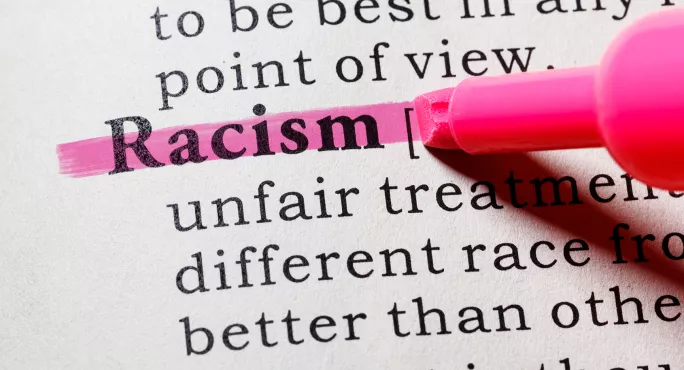Scottish education is ‘institutionally racist’, researchers are told

The Scottish education system is institutionally racist, the annual gathering of education researchers in Scotland has been told.
Keynote speaker Khadija Mohammed, a senior lecturer at the University of the West of Scotland, also said that that “the elephant in the staffroom” was the racism that black, Asian and/or minority ethnic (BAME) teachers were subjected to by colleagues.
Dr Mohammed, who started her career as a primary teacher and is also the first BAME convener of the General Teaching Council for Scotland, stressed that this did not mean every teacher in the system was racist.
However, she said that her research in schools across Scotland, running focus groups with BAME teachers, had found that “schools are institutionally racist”.
Dr Mohammed said she favoured the Stephen Lawrence inquiry’s definition of institutional racism, because it “absolutely refers to the processes, the attitudes, the behaviours that make up that institution and disadvantage those that are not in the majority”.
- Equality: Why must we wait for racial equity progress in schools?
- Diversity: Key messages from landmark diversity in teaching report
- Slow progress: Proportion of BAME teachers barely changes in a decade
- News: Scotland’s General Teaching Council has first BAME convener
She said that when attempting to tackle racism in schools, the focus was often on children being racist to children, children being racist to their teacher, or a teacher being racist to a child.
But she added: “The elephant in the staffroom that no one is talking about is the racism a teacher experiences from another teacher.”
Teachers facing racism in Scottish schools
Dr Mohammed revealed findings from her research during a keynote address at the Scottish Educational Research Association (Sera) annual conference in Edinburgh yesterday.
She said that her research - based on speaking to groups of BAME teachers about their experiences of working in Scottish schools - had uncovered that they often feel isolated, invisible and unable to be their true selves in the workplace.
There was an assumption that in education social justice would be “at the heart of everything we do”, she said, but the lived experience of teachers of colour was that racism was “business as usual” and “normal”.
Dr Mohammed said it was not unusual for BAME teachers to be asked by pupils: “Where are you fae?” and when they named the area of Scotland where they were born and raised, this was then followed up by, “No, no, but where are you really from?”
However, she said her research had found that “it wasn’t just the children and young people that asked that question. Their colleagues asked them that question, too”.
She said one male BAME primary teacher left the profession because the attitudes of colleagues changed towards him after he asked if there was a quiet space in school where he could go to pray.
“He said something just changed suddenly after that,” Dr Mohammed said. “The support was not forthcoming. There were lots of questions, there were comments, there were microaggressions. ‘You lot’ - statements like that. Asking, ‘Why do you have a beard?”
She also talked of BAME teachers finding that white colleagues were more likely to be primed for promoted posts in school.
One BAME teacher said that “we see the professional grooming of our white colleagues into leadership positions…we are excluded from the social networks where those posts are discussed”.
Another said that “it’s not a glass ceiling for us, it’s a concrete ceiling, and it hasn’t even been chipped”.
In Glasgow a policy of ringfencing fixed-term principal teacher posts for BAME candidates has been introduced, Dr Mohammed said.
The researcher, who is also the chair of the Scottish Association of Minority Ethnic Educators, which runs a leadership and mentoring programme - said positive action and sponsorship were needed but so were “care” and “consideration”. She added that there had been a backlash on social media to Glasgow job adverts, which had put BAME teachers off applying for the posts.
She said that councils had to be transparent about the reasons for taking positive action, as BAME teachers “face discrimination-based racism at every stage of the promotion process and what we are doing is eliminating some of those barriers”.
Dr Mohammed said the latest figures showed there has been a small increase in the number of minority-ethnic teachers in Scotland’s schools, from 945 in 2021 to 980 in 2022.
However, that amounts to only 1.8 per cent of the teaching workforce, with fewer than 1 per cent of teachers in promoted posts identified as BAME.
Scotland has a target that at least 4 per cent of teachers should identify as minority ethnic by 2030.
Positive developments, she said, included Education Scotland’s “building racial literacy” programme; the work on diversifying the teaching profession; and the new anti-racism framework for initial teacher education, which she wrote.
Dr Mohammed said that, going forward, initial teacher education institutions need to look at how they are marketing and promoting their courses; racist incidents in schools need to be documented and recorded so something can be done - and they are not swept under the carpet; and work on decolonising the curriculum needs to continue.
Register with Tes and you can read two free articles every month plus you'll have access to our range of award-winning newsletters.
Keep reading with our special offer!
You’ve reached your limit of free articles this month.
- Unlimited access to all Tes magazine content
- Save your favourite articles and gift them to your colleagues
- Exclusive subscriber-only stories
- Over 200,000 archived articles
- Unlimited access to all Tes magazine content
- Save your favourite articles and gift them to your colleagues
- Exclusive subscriber-only stories
- Over 200,000 archived articles
topics in this article



